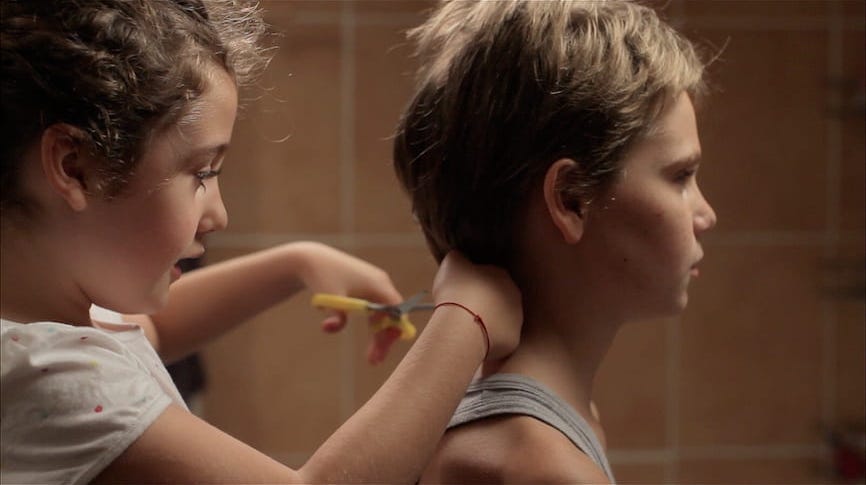Hi Caspar. It's Sunday and granddad is serving Sunday lunch to all of the extended family. You're very tired and not really looking forward to it because granddad is actually a bit of a dickhead, however, you can't be late. What film are you putting on for the 1.5hours before you leave the house to help you get pumped up and ready to go?
Hi there! I’m going to give you two answers, both of which are sincerely meant.
1. The scenario you evoke is a familiar one — on a Sunday morning in the not so distant past, my sister and I would occasionally have to get our tired selves out of our respective doors, meet up disconsolately at a tube somewhere and haul our dejected asses about as far across drizzly London as is possible, to visit our elderly great-aunt Brige (RIP). Unlike granddad, Brige was not an arsehole at all, but somehow, combined with a hangover sent from Beelzebub himself, her very personal brand of genteel, Katherine Mansfield-ian disconnected otherness could send you to within a hair’s breadth of psychic meltdown. I once saw a wooden bowl in her house and asked her about it; she told me it had been made for her by a distant cousin, from a single piece of wood; I observed, “So Antoine whittled that all by himself?” and Brige went, “Whittle? What does whittle mean? Whittle…? I’ve never heard such a word. My father must never have said it.”
In such times, I yearned for some external provision of fortitude that might help me overcome this kind of alienation, the generational disconnect; my sister and I had about enough strength to get us through afternoon tea, but there remained a sense of our characters being somehow diminished by the encounter. Something about taking such a huge run-up to the meeting, and then remaining there, preserved in Aspic, running down the clock until breathing time, really fucking took it out of one.
All this to say that I understand my mission, and choose to accept it. I am honoured by the faith that you have vested in me; I keenly feel my responsibility. By god! I will not let you down.
What is required in my opinion is a film that will run suitably counter to the event you have outlined, in order to bolster you throughout it. I am not sure that getting pumped up is the correct strategy here, if I may say so. What you want is a long-simmering film that will keep producing energy throughout the day, like a bowl of cereal. An energy drink on the contrary will wear off too soon, and leave you feeling crushed, battered. Something that exists at cross purposes to family dinner will hearten you, because it will feed your individuality; it will lighten up all of the other elements of this world, bringing you resources, alternatives.
For some reason, the first film that springs to mind is Céline Sciamma’s Tomboy (2011), a reimagining (I believe, although I don’t think Sciamma has ever been asked about this or stated it herself) of Kimberly Peirce’s Boys Don’t Cry (1999). This film about gender performance, which so ably describes the profound discomfort of growing up, and which is tender and compassionate while somehow being unbearably acute and painful, will really sit at odds with family dinner, and will linger in the recesses of your mind — vignettes turning over, there, in the back: a fleeting image of the child, Laure/Mickaël, being forced to wear a dress that feels like a straitjacket; cries of joy from a football match that will soon turn sour; the mild and determined wide eyes of this kid, set on the path that feels right to them. Ah, how peaceful and strong you now feel! You have gained strength from beauty, have been nourished by the profundity of human experience, caught on the fly. What you needed was to contemplate the crushing weight of our existences, the impossibility of living a truly free life — see, see how that empowers you, right now, as you comment on the spuds??!
I also want to put a word in for two other short-ish films that I happen to have seen relatively recently — Suzhou River (Lou Ye, 2000) and Rewind and Play (Alain Gomis, 2022), both available on MUBI at the moment. The former is a rich and woozy fever-dream of simmering eroticism, a strange and sorrowful fantasy of mermaids and sexual perversity, set in a weirdly real and dirty contemporary Shanghai. The lighting alone is so beautiful that it will keep you in a heightened state of wonderment, but beyond that the film features all the alienation and weltschmerz that, as stated above, I believe are paradoxically necessary to get you through Family Time. As for the latter film, it is a documentary revisiting a performance by and interview of Thelonious Monk, on French television in 1969. The film is beautiful, taking in the imperious splendour of Monk’s playing, and then — with the use of previously unseen archival footage — dwelling agonisingly on a clearly racist contretemps between his interviewer and him. What sensitivity, what an unerring eye Gomis shows in the way he reframes this moment! What intelligence, too, in not utilising it for a thin gotcha, but on the contrary leaving it to play out quite naturally, and surrounding it with the presence of a Thelonious Monk whose power, mystery and élan are allowed to speak for themselves. There it is again, the sheer painful crunchiness of our lives, addressed on film, in a way that will burnish your humanity throughout the day!
Finally, I must apologise for being plodding/factual/rigorous in an otherwise stupendously subjective and heady newsletter, but if you’re after more films that come in under 90 minutes, you can also plump for one of the movies discussed on the podcast hosted by m’colleague Sam Clements, or head to the BFI’s streamable selection of movies under an hour and a half. From the former, I would go for Welcome to the Dollhouse (Todd Solondz, 1995); from the latter, it’s got to be The Passion of Joan of Arc (Carl Th. Dreyer, 1928). Two embattled teenage queens, fighting for their lives — let their spirit guide you!
2. What film is good for making me feel like a fuzzy peach? What songs should I listen to in order to get through my break-up with someone I met last week? What movie can I watch when I don’t want to do my tax return? What Renaissance paintings should I gaze at when I’m feeling a bit meh?
Art is not here to save you! It isn’t a handy salve for your soul, and it isn’t to be used in utilitarian terms, to plug a gap that just became vacant; there simply isn’t a film for every mood, and peeling over a close-up in a movie or the lyrics of a song that otherwise hold so much else in terms of craft and unknowable life-force, is an impoverished way to look at art! We have all too readily internalised the idea that film and music can be commodified in a way that will suit us; that grabbing a piece of art on the go, in 90 minutes, will get some much-needed artistic vitamins down you; that a novel “changed you” for real for real; that Taylor Swift didn’t miss when she said that; that our relationship to art defines us in some way, because, look, here is my Letterboxd 4 and my Spotify Wrapped; that the plain text of a film is what it is and all it is. No! Reject these shibboleths when you see them, cleave them with your sword! Watch a film and say, honestly, to your friends, that you don’t know what you think about it, that you’re lost, you saw movement and imagery, there were tears in there and music and sex, you were turned on and alive, you were baffled, you gazed in wonder at silver sunlight on the sea, and what lessons can you expect to draw from that for God’s sake, what thin purpose or solitary use does it hold? Can it not just be? Can’t you simply go there — be in its presence, meet it?
Of course art exalts us; it is what lifts us from the mundanity of the everyday. To hear Mahalia Jackson bellow the big note on “If I Can Help Somebody” is to become acquainted with the supernatural — it shakes you to the core. But putting it on every time your heart is broken will not always work, because the effects of art cannot be programmed; it won’t be plied to circumstances, it lives in a different state. You can dial up When Harry Met Sally as much as you like when you’re feeling low, but admit it, “I’ll have what she’s having” gives diminishing returns once you’ve imposed yourself on the film a dozen times over, begging it to dig you out of the muddle you’re in.
And it isn’t simply a problem of reducing art, because in doing so we reduce our very selves and everything of which we are capable — our mood swings, creativity, experiences, sexuality, hopes, dreams, viciousness and cruelty, heart. You, yes you, can be brought to your knees by light through high windows in a cold cathedral. Can that person be defined? Do you yourself know that person?
What we make battle with is time and money — our lifespan, and capitalism, which put limits on our joy and wonder. How can we find the freedom to come to art on honest terms, when we are so constrained on every side? No wonder we filch and grab whatever art we can, feeding ourselves poorly from whatever source we find — but are you nourished? Are you full?
Send your questions anonymously to Caspar at this link, no personal information is collected.







